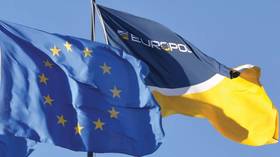EU goes after Russian assets

Europol and other EU agencies have teamed up with the bloc’s members to facilitate criminal investigations into the assets of individuals and entities sanctioned over Russia’s ongoing military offensive in Ukraine.
"Operation Oscar" will also support probes by EU nations into alleged violations of economic and trade restrictions placed on Moscow, Europol announced on Tuesday.
The “umbrella operation” will last for at least a year and is set to include a number of parallel investigations. In many ways it’s similar to Operation Sentinel, which was carried out during the Covid-19 pandemic to tackle fraud against the EU’s recovery funds.
As part of Operation Oscar, Europol plans to centralize and analyze the data coming from member states “to identify international links, criminal groups and suspects, as well as new criminal trends and patterns.”
The EU law enforcement agency will also support probes into sanctioned assets financially by offering operational coordination, forensics and technical expertise.
The bloc’s criminal justice cooperation agency Eurojust plans to provide legal assistance to the bloc's members during the operation, while border control agency Frontex will contribute by “enhancing the scrutiny” of sanctioned individuals, who may try to enter the EU by air, land or sea.
The international backlash in response to the Ukrainian conflict has made Russia the most sanctioned country in the world. Last week, Brussels unleashed its fifth package of penalties, which among other things barred Russian ships from EU ports and its lorries from entering the bloc’s territory, imposed an embargo on Russian coal and banned imports of fertilizers.
No bloc-wide decision has yet been made on sanctioning Russian gas and oil. Lithuania cut off imports of Russian gas on its own in early April and urged other nations to follow suit.
Over the past few weeks, yachts, planes and real estate have been seized from wealthy Russians in France, Italy and other EU countries. The latest targets were former Formula One driver Nikita Mazepin, who was fired from his team over the events in Ukraine, and his billionaire father Dmitry Mazepin. Italian police said on Monday that authorities had taken control of the Mazepin’s ranch in Sardinia, understood to be valued at around $115 million.
Russia launched a large-scale offensive against Ukraine in late February, following Ukraine’s failure to implement the terms of the Minsk agreements signed in 2014, and Russia’s eventual recognition of the Donbass republics of Donetsk and Lugansk. The German and French brokered Minsk Protocol was designed to give the breakaway regions special status within the Ukrainian state.
Moscow has since demanded that Ukraine officially declare itself a neutral country that will never join the US-led NATO military bloc. Kiev insists the Russian offensive was completely unprovoked and has denied claims it was planning to retake the two rebel regions by force.













